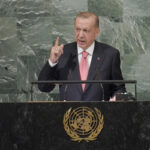NEW YORK — United Nations Secretary-General António Guterres warned that war, famine and climate change are setting the stage for a ‘a winter of global discontent’ in his remarks opening the U.N. General Assembly on Tuesday morning.
Speaking to a crowd that included heads of state, many of whom will address the General Assembly this week, Guterres warned that these and other ills including global inflation and growing economic inequality pose acute challenges demanding swift action. But he went on to express frustration that nations are hesitant to meet the moment.
“We are in rough seas,” Guterres said. “A winter of global discontent is on the horizon. A cost-of-living crisis is raging. Trust is crumbling. Inequalities are exploding. Our planet is burning. People are hurting — with the most vulnerable suffering the most.”
“The United Nations Charter and the ideals it represents are in jeopardy. We have a duty to act,” continued Guterres, a former prime minister of Portugal.
“And yet we are gridlocked in colossal global dysfunction. The international community is not ready or willing to tackle the big dramatic challenges of our age. These crises threaten the very future of humanity and the fate of our planet. Crises like the war in Ukraine and the multiplication of conflicts around the globe. Crises like the climate emergency and biodiversity loss.”
Guterres has long advocated for ambitious policies to mitigate climate change. Last week, in a press conference setting the stage for the General Assembly, Guterres argued that recent extreme weather events in developing countries demonstrate the severe injustice of climate change, in which greenhouse gas emissions from rich nations cause disasters in poorer countries less able to adapt and recover.
“I have just returned from Pakistan, where I looked through a window into the future,” Guterres said last week, referring to widespread flooding in the impoverished South Asian nation. “A future of permanent and ubiquitous climate chaos on an unimaginable scale: devastating loss of life, enormous human suffering, and massive damage to infrastructure and livelihoods. … What is happening in Pakistan demonstrates the sheer inadequacy of the global response to the climate crisis, and the betrayal and injustice at the heart of it.”
On Tuesday, Guterres broadened his focus to include other ills such as “social media platforms based on a business model that monetizes outrage, anger and negativity” and “hate speech, misinformation and abuse — targeted especially at women and vulnerable groups.”
But he returned to climate change, with a heavy focus on the subject and specific policy prescriptions, including calling on developed countries to tax windfall profits of fossil fuel companies with the proceeds directed to the poorest communities suffering the consequences of climate change.
“The climate crisis is the defining issue of our time,” Guterres said, calling out policymakers who put it on “the back burner.”
“We have a rendezvous with climate disaster. I recently saw it with my own eyes in Pakistan — where one-third of the country is submerged by a monsoon on steroids. We see it everywhere. Planet earth is a victim of scorched earth policies. The past year has brought us Europe’s worst heat wave since the Middle Ages. Megadrought in China, the United States and beyond. Famine stalking the Horn of Africa. One million species at risk of extinction. No region is untouched. And we ain’t seen nothing yet.”
Guterres went on to call on developed countries to meet their commitment made in Glasgow, Scotland at the last U.N. Climate Change Conference, also known as COP26, to double funding for developing countries to adapt to climate change and develop renewable energy. He also echoed a call from developing countries for rich countries to commit funding at the next U.N. Climate Change Conference — COP27, in Sharm-el Sheikh, Egypt, this November — to compensate poorer countries for losses and damages suffered from climate change.
“The G20 emits 80% of all greenhouse gas emissions,” he said, referring to the world’s biggest economies. “But the poorest and most vulnerable — those who contributed least to this crisis — are bearing its most brutal impacts. Meanwhile, the fossil fuel industry is feasting on hundreds of billions of dollars in subsidies and windfall profits while household budgets shrink and our planet burns.”
He added: “Excellencies, let’s tell it like it is. Our world is addicted to fossil fuels. It’s time for an intervention.”
The secretary-general also called for nations to agree to a new framework for protecting biodiversity, and for the G20 to provide funding for sustainable development and debt relief in the least developed countries.
Many G20 leaders, including President Joe Biden, will speak at the U.N. this week. But one head of state will be notably absent: Russian President Vladimir Putin, whose invasion of Ukraine has been widely condemned internationally, is skipping the General Assembly. (Traditionally, the U.S. president speaks on the first day of the General Assembly, but Biden will speak on Wednesday because he just got back from Queen Elizabeth II’s funeral in London.)
“We know lofty ideals must be made real in people’s lives,” Guterres concluded. “So let’s develop common solutions to common problems.”




